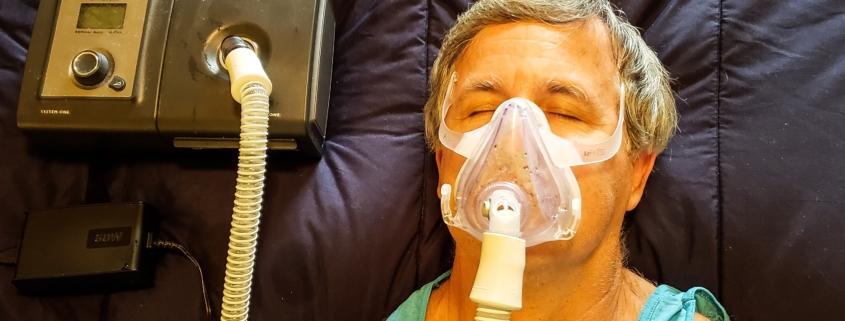How a CPAP Cancer Attorney Can Help You
When you have trouble getting sleep at night or have a medical condition that makes it challenging to get the good night’s rest your body needs, not only is it frustrating but detrimental to your health. People who suffer from sleep apnea turn to breathing devices and ventilators as a solution. CPAP machines or continuous positive airway pressure therapy devices are used to treat obstructive sleep apnea. Patients struggling with sleep apnea often use these kinds of devices on a nightly basis to maintain a normal breathing rhythm as they sleep. Specific devices made by Philips Respironics, including their Bi-Level Positive Airway Pressure machine (Bi-Level PAP) and CPAP machines, may have put users at risk by exposing them to potentially cancer-causing compounds.
The company has recalled millions of these devices and has advised owners of C-PAP and Bi-Level PAP machines to discontinue use immediately. Patients using their mechanical ventilator as a life-sustaining device should continue using their machine and contact their doctor to discuss alternative options. At Blizzard Greenberg, our defective medical devices lawyers are prepared to advocate on your behalf. If you or a loved one has suffered serious side effects or been diagnosed with cancer after using a Philips breathing device, you may be entitled to compensation. Read on to discover how one of our CPAP cancer attorneys can help you get the justice you deserve.
What is Sleep Apnea?
According to the American Sleep Apnea Association, approximately 22 million Americans suffer from sleep apnea. There are multiple different types of sleep apnea, and about eight million Americans use CPAP Machines to treat this disorder.
The three primary types of sleep apnea are:
Obstructive sleep apnea -— is the most common type of sleep disorder. This form of sleep apnea happens when a person’s throat muscles relax, and their breathing repeatedly stops and starts.
Central sleep apnea -— this form of sleep apnea happens when a person’s brain fails to send the right signals to the muscles responsible for controlling your breathing.
Complex sleep apnea -— when a person has central and obstructive sleep apnea, it’s known as complex sleep apnea or treatment-emergent central sleep apnea.
While anyone can suffer from sleep apnea, including children, there is some risk factors that could put you at an increased risk. These risk factors include having narrow airways, being overweight, smoking, having a history of sleep apnea, having diseases like high blood pressure or type 2 diabetes, being older, or being male. If you suffer from sleep apnea, it is recommended that you seek out the advice of a medical professional.
Some common signs or symptoms of sleep apnea include:
- Dry mouth
- Irritability
- Loud snoring
- Episodes of stopped or shallow breathing
- Daytime sleepiness
If sleep apnea is left untreated, it can cause you to have significant health issues such as developing high blood pressure, Type 2 diabetes, or suffering from a sudden heart attack. CPAP machines mitigate the effects of sleep apnea, so addressing recent issues with these devices is essential.
Why Were Philips CPAP Devices Recalled?
CPAP Machines are used by fitting a face mask over the user’s mouth and nose during sleep. These devices provide the user with a steady flow of oxygen that increases the air pressure in their throat and keeps their airways open. BiPAP machines are often used by individuals who cannot tolerate a CPAP machine. Users of both CPAP and BiPAP devices use them regularly every night.
Philips announced a recall of their CPAP and BiPAP devices and ventilators because of a defect with the polyester based polyurethane foam (PE-PUR) used in the machine to absorb noise and vibration. When this foam is broken down, it releases compounds and toxic chemicals that could potentially cause cancer or other health hazards. Some users have reported seeing black debris in the air pathway. While the reason for the degrading foam remains unclear, the company cites that exposing the device to high heat, humidity, or unapproved cleaning methods could intensify the breakdown rate of the foam.
How Would I Know If My CPAP Machine is Causing Me Harm?
Seeing your doctor is the best and most accurate way to determine if using one of the recalled Philips CPAP devices has been hazardous to your health. You may be unaware of a serious issue that your primary healthcare provider should address as soon as possible.
Some potential side effects you may experience from the emitted particles include:
- Headache
- Skin or eye irritation
- Irritation of the respiratory tract
- Coughing
- Dizziness
- Sinus infection
- Nausea
- Chest Pressure
If you are experiencing any of the listed side effects, do not hesitate to speak with a medical professional as soon as you can. You may be entitled to financial compensation if you believe that your Philips CPAP or BiPAP machine is responsible for your illness.
What If I Suspect My CPAP Machine Caused My Cancer?
The company has not currently revealed the number of patients affected by a recalled Philips CPAP machine. However, if you have suffered side effects or adverse health issues after using a Philips recalled device, you may be able to file a defective product lawsuit. Speak to your doctor immediately if you suspect that your illness is related to toxic chemicals the device may have exposed you to.
Call Us Today to Schedule a Free Case Evaluation with a CPAP Cancer Lawyer
When a physician prescribes a device for a medical condition you are struggling with, the last thing you expect is for your illness to get worse. At Blizzard law, our compassionate and dedicated team of defective medical device lawyers understand that the consumer should not be responsible for damages caused by defective products. If a company knowingly produced and sold a dangerous device that directly contributed to your injuries, they will have an obligation to right their wrong.
Contact our office at (866) 560-1867 or send us an email to schedule a meeting with one of our product liability lawyers today! Our initial consultation is always free, and one of our expert attorneys can help you determine if you are eligible to pursue compensation.













